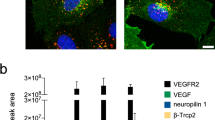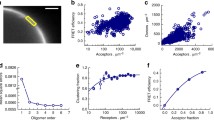Abstract
Tek/Tie2 is an endothelial cell-specific receptor tyrosine kinase that has been shown to play a role in vascular development of the mouse. Targeted mutagenesis of both Tek and its agonistic ligand, Angiopoietin-1, result in embryonic lethality, demonstrating that the signal transduction pathway(s) mediated by this receptor are crucial for normal embryonic development. In an attempt to identify downstream signaling partners of the Tek receptor, we have used the yeast two-hybrid system to identify phosphotyrosine-dependent interactions. Using this approach, we have identified a novel docking molecule called Dok-R, which has sequence and structural homology to p62dok and IRS-3. Mapping of the phosphotyrosine-interaction domain within Dok-R shows that Dok-R interacts with Tek through a PTB domain. Dok-R is coexpressed with Tek in a number of endothelial cell lines. We show that coexpression of Dok-R with activated Tek results in tyrosine phosphorylation of Dok-R and that rasGAP and Nck coimmunoprecipitate with phosphorylated Dok-R. Furthermore, Dok-R is constitutively bound to Crk presumably through the proline rich tail of Dok-R. The cloning of Dok-R represents the first downstream substrate of the activated Tek receptor, and suggests that Tek can signal through a multitude of pathways.
Similar content being viewed by others
Author information
Authors and Affiliations
Rights and permissions
About this article
Cite this article
Jones, N., Dumont, D. The Tek/Tie2 receptor signals through a novel Dok-related docking protein, Dok-R. Oncogene 17, 1097–1108 (1998). https://doi.org/10.1038/sj.onc.1202115
Received:
Revised:
Accepted:
Published:
Issue Date:
DOI: https://doi.org/10.1038/sj.onc.1202115
- Springer Nature Limited
Keywords
We’re sorry, something doesn't seem to be working properly.
Please try refreshing the page. If that doesn't work, please contact support so we can address the problem.




